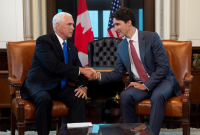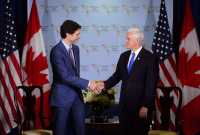Support strong Canadian climate journalism for 2025
Canada's trade minister is endorsing a European Union plan to set up an alternative to the World Trade Organization's appeals panel, in case a U.S. refusal to appoint new members paralyzes it by the end of the year.
Jim Carr said the EU's plan to set up a proxy version of the WTO's Appellate Body has merit and deserves further examination. The EU wants to set up an alternative arbitration process that would essentially mirror the function of the Appellate Body.
The United States is blocking appointments to fill vacancies at the Appellate Body, which is an appeal court of sorts for the WTO's Dispute Settlement Body. The two groups deal with international complaints about trade policies, such as tariffs and domestic content requirements.
The appeals body is down to three members from its normal seven, and two of the remaining members' terms expire in December. If no approvals for new vacancies are forthcoming by then, the body will be down to one member, from China, and could effectively shut down.
"The European Union is looking at alternate ways, probably in an interim period, to make that transition less disruptive than it otherwise would be," Carr said in a recent interview.
"We knew that the Europeans were likely to make public these possibilities and we're open to it, and we welcome the creativity behind it. And we also know that the clock is ticking."
President Donald Trump, along with other members of his administration, has disparaged the Geneva-based WTO as a disaster for the U.S. — part of his broader wrecking-ball approach to the international trading order.
The latest example of that came last week when Trump injected fresh uncertainty into the ratification of the new North American trade agreement. Just hours after Vice-President Mike Pence held talks in Ottawa with Prime Minister Justin Trudeau aimed at pushing on with ratification, Trump threatened Mexico with new tariffs.
Trump said he would impose a five-per-cent duty on Mexican imports as of June 10 if it doesn't stem the flow of migrants, mainly from Central America, into the U.S.
Trump's latest threat comes after he extolled the virtues of the new United-States-Mexico-Canada Agreement as a strong replacement for NAFTA, which he called probably the worst trade agreement in his country's history, at recent event at the White House.
In the same breath, Trump railed against the WTO, blaming it for everything he sees wrong with the global trade landscape. Trump said on May 23 that the WTO "may be even worse because of what it's done with respect to trade, and international trade and trade with China, what it's done for China and how much money our country has been losing to China."
Canada has convened about a dozen like-minded countries — minus the U.S. and China — to try to reform the WTO, and Carr said the EU's proposal to keep the Appellate Body functioning has been discussed there. In October, Carr hosted the ministers for their inaugural meeting in Ottawa.
A discussion document circulated at the meeting, a copy of which was obtained by The Canadian Press, succinctly summarized the looming crisis with the Appellate Body: "The impasse of the appointment of the appellate body members threatens to bring the whole dispute settlement system to a halt."
According to a Bloomberg report last week, an EU document described its proposal as an attempt to replicate the "essential principles and features" of the Appellate Body so its function can continue.
The EU proposal was not formally on the agenda of the October talks in Ottawa, said Carr.
"But in the side conversations, you're always reviewing ideas from others as they are articulated," he said.
"If you can get consensus that takes some of the edge off the hard stop of Dec. 10 and keep the dispute settlement function intact, even if it's only for a temporary period, then that's an idea I think all countries should be prepared to consider."
Carr and his counterparts from the like-minded group also talked on the margins of the recent Paris meetings of the Organization for Economic Co-operation and Development, and will gather next week at a meeting of G20 finance ministers in Japan.
The group is trying to present a series of workable proposals that could then be brought forward to the U.S. and China.
"Ultimately, we're going to have to achieve consensus with the major economies of the world. That's the only way that any kind of WTO reform will be sustainable," said Carr. "Meanwhile, we're looking at other possible measures between now and the end of the year."
The EU Embassy in Ottawa declined comment.





Comments